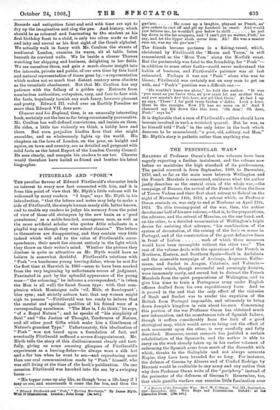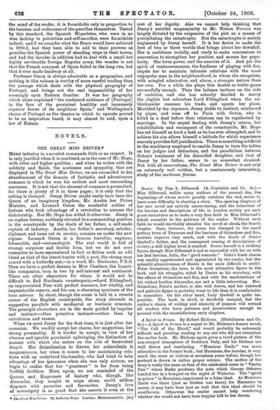THE PENINSULAR WAR.*
READERS of Professor Oman's first two volumes have been eagerly expecting a further instalment, and the volume now before us maintains the high standard of its predecessors. The period covered is from September, 1809, to December, 1810, and, so far as the main issue between Wellington and the French Marshals is concerned, embraces what the author justly describes as the central crisis of the whole war,—the campaign of Busaco, the arrival of the French before the lines of Torres Vedras and their first short retreat to Sobral on the night of November 14th, 1810, a retreat which, as Professor Oman reminds us, was only to end at Toulouse on April 11th, 1814. To this turning-point of the war, then, the author devotes one half of his new volume,—that is, to the preparations, the advance, and the retreat of Massena, on the one hand, and, on the other, to a detailed examination of Wellington's triple device for assisting that advance, "his combination of the system of devastation, of the raising of the levee en masse in Portugal, and of the construction of the great defensive lines in front of Lisbon each of which three measures would have been incomplete without the other two." The rest of the volume deals with the operations of the French in Northern, Eastern, and Southern Spain—Soult in Andalusia and the miserable campaign of Areizaga, Augereau, Keller- mann, and Suchet in Aragon, Catalonia, and Valencia— operations which, though successful and seemingly decisive, were immensely costly, and served but to distract the French Marshals from the quiet preparations of Wellington, and to give him time to train a Portuguese army under English officers drafted from his own expeditionary force. And so it proved in the end that the only effect of the victories of Soult and Sachet was to render the expulsion of the British from Portugal impossible, and ultimately to bring down Joseph's kingdom in ruin about his ears. Concerning this portion of the war Professor Oman has obtained much new information, and the monotonous tale of Spanish failure, though it suffers considerably from the lack of a good strategical map, which would serve to bring out the effect of each movement upon the other, is very carefully and fully described. Moreover, recent research bas justified a certain rehabilitation of the Spaniards, and the author is able to carry on the work already taken up in his earlier volumes of redeeming the Spanish arms from much of the discredit with which, thanks to the Gallophile and not always accurate Napier, they have been branded for so long. For instance, the defence of Gerona by Alvarez and of Ciudad Rodrigo by Herrasti would be creditable to any army and any nation (but why does Professor Oman write of the "periphery" instead of the perimeter of the defences of Gerona?) Remember, too, that while guerilla warfare can exercise little fascination over • A History of the Peninsular War. By C. W. C. Oman. Vol. III., September, 1809 —December, 1810. With Maps and Illustration& Oxford : at the Clarendon Frees. 1.14a. net.] the mind of the reader, it is formidable only in proportion to the heroism and endurance of the guerillas themselves. Tested by this standard, the Spanish Iliqueletes, who were in no wise lacking in patriotism and self-sacrifice, were formidable indeed; and if we consider what the Boers would have achieved in 1900-2, had they been able to add to their prowess as guerillas the Spanish power of standing siege in their towns, and had the invader in addition had to deal with a small but highly serviceable foreign Regular army, the wonder is not that the French conquest of Spain failed in the long run, but that it ever made headway at all.
Professor Oman is always admirable as a geographer, and nothing in this volume is worthy of more careful reading than the passage which deals with the physical geography of Portugal, and brings out the real impassability of her seemingly open Eastern frontier. It was her geography which alone explained "the continued existence of [Portugal] in the face of the persistent hostility and immensely superior forces of its neighbour Spain," and Wellington's choice of Portugal as the theatre in which to operate proved to be an inspiration based, it may almost be said, upon a law of Nature.















































 Previous page
Previous page